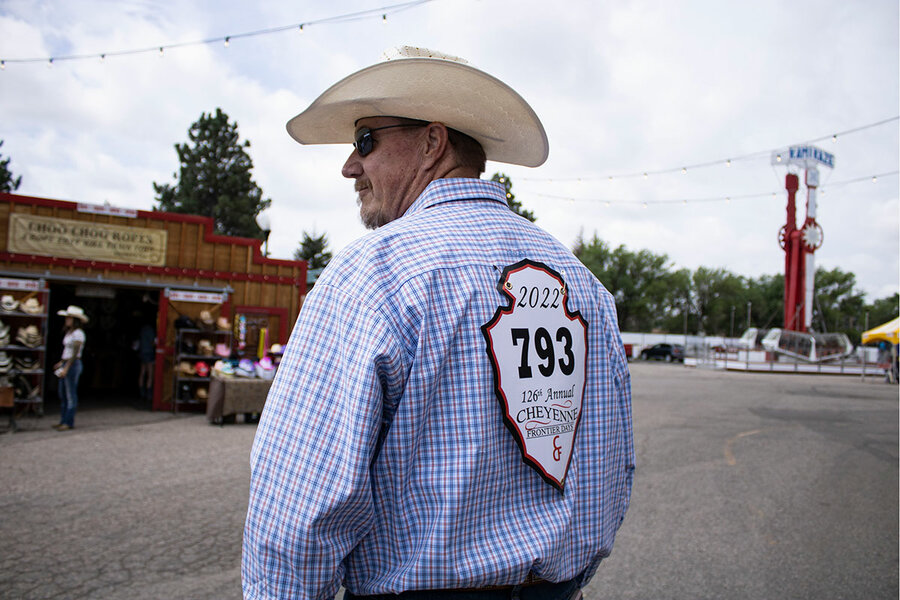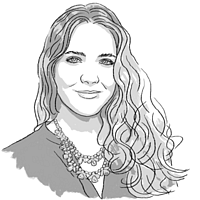Before the broncos buck, heads bow at cowboy church
Loading...
| Cheyenne, Wyo.
Soon funnel cakes will melt in mouths, lines for lemonade will form, the arena will ring with the national anthem, horses will buck, and fringe will fly.
But first, cowboys pray.
The cowboy church service at Cheyenne Frontier Days, an iconic Wyoming rodeo, offers an hour of grace before the games begin. Last Sunday’s blend of Christianity and the American West convened disciples in denim and 10-gallon hats. The open setting – a rodeo arena – reflects an open attitude: Come as you are and find respect.
Why We Wrote This
When church convenes at the rodeo, these cowboys say they feel welcome – and respected.
Organ prelude out. Johnny Cash in.
“One piece at a time ...” Mark Eaton sings a line from the Cash track playing as folks find bleacher seats. Like many here, the pastor wears a button-down shirt, jeans, and boots.
Beyond faith in Jesus and the Bible, he tells the Monitor, the setup isn’t Christian in a traditional religious sense, his fingers wrapping air quotes around the word “Christian.”
“In church, we’d have an organ playing. And these people won’t show up,” he says. “They’re tired of somebody who doesn’t understand their lifestyle telling them they need to do more and try harder.” His talk today is on being good.
“A good God makes good people, and good people make good societies,” he says, pacing in front of the dirt expanse.
Mr. Eaton comes from the “coffee culture” of Seattle. Married to Christian singer Susie McEntire-Eaton (sister of the Grammy-winning Reba McEntire), he now lives on a family ranch in Oklahoma.
Ms. McEntire-Eaton couldn’t come to the service due to a COVID-19 diagnosis, Mr. Eaton tells her fans. A co-host of Cowboy Church TV and descendant of rodeo royalty herself, she began holding these Cheyenne Frontier Days services in 1986. Republican Gov. Mark Gordon, briefly taking the mic, leads a prayer that includes her. Prayers here cue cowboy respect: Remove your hat as you bow your head.
Beyond pop-up services held at rodeos like this, similar cowboy churches have cropped up across the country – since at least the late ’80s – in dedicated spaces. Sometimes that means a barn. “Cowboy Christians” author Marie Dallam writes in an email that the church aims to welcome worshippers who have been marginalized from mainstream Christian congregations. (For others, “biker church” meets a similar need.)
The cowboy church is “defined mostly by behaviors and structures, and perhaps somewhat by values and expectations, but not by theological differences,” adds Dr. Dallam, a professor at the University of Oklahoma. “In its ideal form, the cowboy church is an evangelical Protestant church that eschews formality and deliberately lowers social barriers in order to welcome people who don’t typically feel comfortable in traditional churches.”
For some, it’s their first time here.
“It just seemed like an open-air atmosphere would be good,” says Randall Shedd, a Republican state representative from Alabama. He’s one of several out-of-towners.
For others, it’s a homecoming.
“As cowboys and Christians, we all share that same – those values and those morals. ... Helping each other out, showing love,” says Willy Evans of Torrington, Wyoming, who’s attended similar services. Ms. Evans, who rides horses with her granddaughter, says she competed in rodeos growing up as a cowgirl.
“As I got older, goat tying became my favorite,” she says, here on a date. Her American flag earrings dangle.
Mr. Eaton dips briefly into politics in a way that squares with Old West individualism. He laments the idea that it’s “the nation’s responsibility to take care of me.”
“You cannot legislate kindness. And if you try, it always looks like taxation,” he says to some chuckles. He competes with the low hum of what looks like tractors rumbling across the arena.
After the service, cowboy Wil Nichols saunters past vendors selling jerky and rope. He’s inspired by the call to be good and appreciates the fellowship. He says cowboys walk the talk of Christian values.
“Friendship and looking out for one another,” he offers as examples. “When you compete against other people, but you cheer them on just as much as you want to win.”
No matter that he didn’t qualify to compete in team roping. He came to the rodeo Sunday, a spectator this time, to cheer on others.








